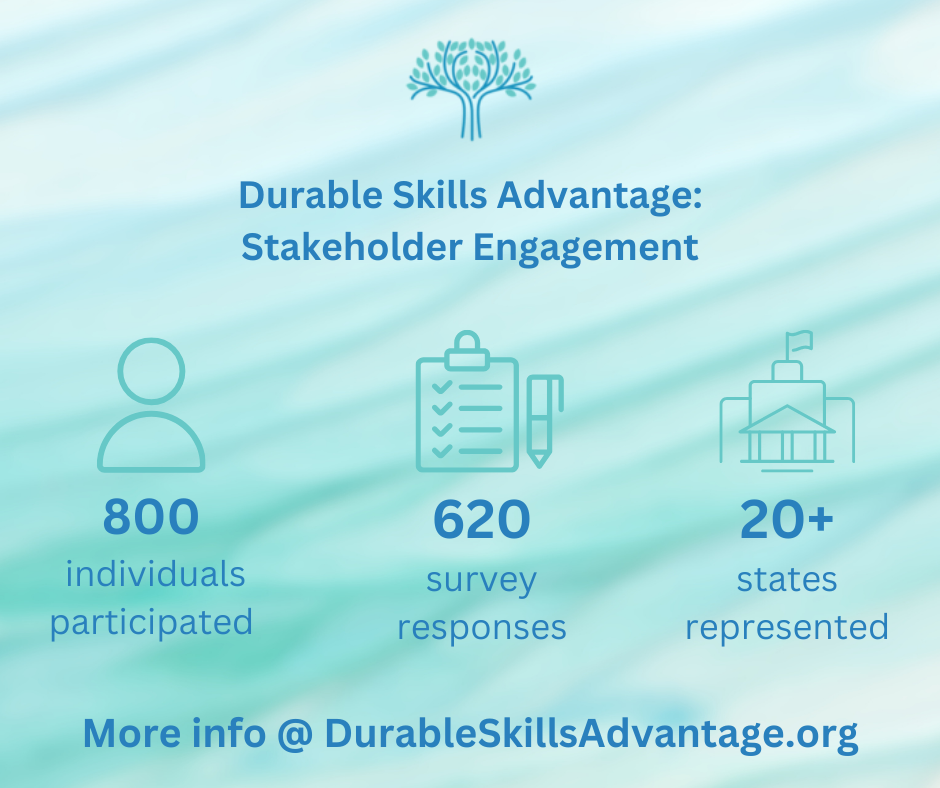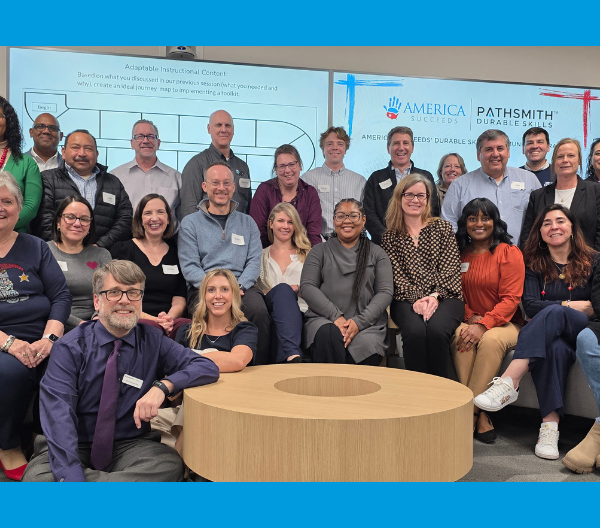In an ever-evolving job market, Durable Skills remain critically important, in addition to technical skills, in the workplace – but how can we measure Durable Skills effectively? In the Spring of 2023, America Succeeds, in partnership with CompTIA, embarked on a mission to create a national competency framework for Durable Skills. The Durable Skills Advantage Framework brings clarity around what these essential competencies are and why they matter, with a core focus on equity-driven practices. The ultimate goal? To empower successful careers while improving the transition from education to the workforce.
Here’s the story of how we brought hundreds of stakeholders to the table to do just that.
Phase I – SME Convening: Defining The Competencies
The journey began with a call to subject matter experts (SMEs) from diverse industries. The selection process, led by CompTIA, was meticulous. To ensure that a broad range of experiences and perspectives were represented among the 20 SMEs, we included five young people representing the target audience for the Framework, four of whom were women. Their presence brought a valuable perspective, as they challenged older participants who questioned the relevance of certain skills and their practical application in the workplace.
The experts convened in New Orleans, where they engaged in intense, all-day discussions. The first day was dedicated to finding consensus among the 20 individuals, and from the second day onwards, the group was divided into smaller teams to efficiently work through definitions and wording.
Throughout the rigorous debates, reflecting the complexity of defining and interpreting these skills, the atmosphere remained respectful and collaborative. Skills that were thought to be straightforward took on new dimensions when viewed through the lens of various industries and personal backgrounds. The spirited debates reflected the complexity of defining and interpreting these skills, with each SME bringing their unique perspective to the table.
By the end of the week, these SMEs crafted the initial draft of the Framework, defining the 110 Durable Skills competencies across four proficiency levels.
Phase II – Feedback Sessions & Equity Centered Design
Following the SME convening, America Succeeds and CompTIA held 11 feedback sessions, both in person and virtually, involving around 350 participants. These sessions provided a high-level overview of the work done so far and involved activities focusing on subskills of Durable Skills.
Participants divided into groups examined definitions, exploring what resonated with them and what didn’t. Business leaders expressed their expectations of new hires, while educators raised concerns about the practicality of expecting these competencies from entry-level workers. Additionally, employers often struggled to articulate their needs in job descriptions and lacked consistency in their hiring processes. This disconnect between education and business perspectives highlighted the need to bridge the gap and align language.
Witnessing the gap between education and business expectations, it became apparent that America Succeeds could play a pivotal role in closing it. Employer views related to Durable Skills measurement and value were identified as a significant challenge. America Succeeds recognized that driving change in this complex system required a multifaceted approach beyond language alignment.
Simultaneously to the feedback session, America Succeeds partnered with Common Group, an equity and human-centered design firm, who conducted qualitative research to ensure equitable practices. This research included input from historically disenfranchised and underserved individuals within the workforce to ensure equitable practices are maintained throughout Framework development and implementation.
Phase III – Convening an Educator Advisory on Durable Skills Definitions
The Educator Advisory comprised three virtual meetings, involving various education sector professionals. They provided valuable input on the definitions crafted by the SMEs and made recommendations regarding wording, framing, context, and the use of the Framework in the education space. The advisory stressed the importance of making the Framework easily accessible and usable to a wide audience.
One of the key contributions of the Educator Advisory was the focus on aligning education professionals’ expectations with business demands. Durable Skills emerged as a common lexicon that helped bridge the gap between these two vital sectors.
Phase IV – Synthesis for Perfection
In the final phase of the process, feedback gathered from various sources throughout the process was consolidated and integrated into the final Durable Skills Framework. From the 12 separate Framework sessions, a range of nuanced perspectives and critical insights were collected. The survey crafted by CompTIA and research findings from Common Group added depth and cohesion to a refined, final version of the Framework.
The amalgamation of inputs was crucial to ensure the Durable Skills Framework was comprehensive, reflective of the diverse perspectives, and aligned with stakeholders’ needs and objectives. The synthesis of expert opinions, statistical data, and empirical evidence make the Framework inclusive and robust.
What’s Next with the Durable Skills Advantage Framework?
America Succeeds’ endeavor to design the Durable Skills Advantage Framework was deeply rooted in collaboration, inclusivity, and a fervent desire to enhance the synergy between education and business. This pioneering Framework– ready and available for various education, workforce, and employer uses – will help catalyze a more holistic approach to developing every student’s unique potential and improving pathways into economically mobile careers.
For questions, visit our frequently asked questions page or email our team at vchazkel@americasucceeds.org.




